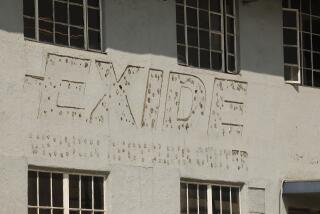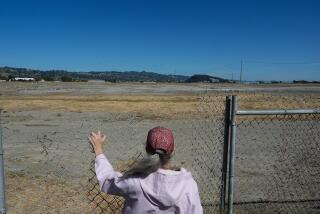A Moral Responsibility
- Share via
In the decades-long saga of a small industrial property in Burbank reported in last Monday’s Times, only two constants remain: Joseph A. Thomson, who owns the property, and the radioactive waste buried there when he bought it in 1966.
Everyone and everything else involved in the property’s tangled history has changed, which makes sticking Thomson with the sole responsibility for cleaning up the waste--at an estimated cost of $10 million--the easy solution.
It doesn’t make it the right one.
As reported by Times staff writer Jean Guccione, a U.S. District Court judge has ruled that Thomson bears at least a share of the responsibility; he knew when he bought the property that radioactive materials had been used there.
But Thomson says the U.S. Atomic Energy Commission, predecessor to today’s U.S. Nuclear Regulatory Commission, told him the site was clean, and he has a letter to prove it.
NRC officials today admit as much and add that the then-AEC should never have released the property for unrestricted use. But they offer only condolences, not help in cleaning up the mess or in pressuring those responsible for creating it to do so.
So Thomson has turned to the courts to try to pin down who shares the responsibility. Here’s where things get even more complicated. Just as the old AEC no longer exists, the firms that occupied the property in the 1950s, working with radioactive isotopes used in X-ray and mining equipment and with rare-earth radioactive elements, are now defunct, their assets acquired by other companies. The firm hired by one of those companies in the early 1960s to decontaminate the site has also changed hands. The new companies deny liability. One cites changing government standards.
It was a new Congress, armed with new information about atomic waste, that urged the NRC to reexamine its closed files on firms that had once operated with AEC or NRC licenses. In 1996, just when the now retired Thomson was getting ready to sell his property, federal regulators paid a visit and declared it contaminated, decades after earlier government regulators had certified it was not.
Thomson can’t sue the NRC because the federal government has immunity from such lawsuits. But there is no immunity from moral responsibility.
Congress had enough doubts about the early days of atomic regulation to order the NRC to reopen its files. Merely finding properties that were improperly released is not enough. It must order the NRC to, if not pay for the cleanup itself, broker a deal between all involved parties to do so.
More to Read
Inside the business of entertainment
The Wide Shot brings you news, analysis and insights on everything from streaming wars to production — and what it all means for the future.
You may occasionally receive promotional content from the Los Angeles Times.










